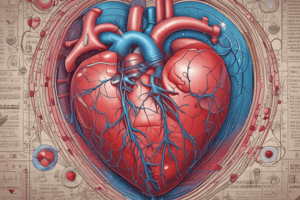Podcast
Questions and Answers
What dietary recommendation is important for clients suffering from heart failure?
What dietary recommendation is important for clients suffering from heart failure?
- High protein intake
- Low sodium intake (correct)
- High carbohydrate intake
- Increased potassium intake
Which of the following statements is true regarding the management of heart failure?
Which of the following statements is true regarding the management of heart failure?
- Increasing afterload will improve cardiac output
- Decreasing fluid intake is unnecessary
- Sodium can be consumed without restrictions
- Monitoring fluid intake is essential (correct)
How can increased cardiac output be achieved in clients with heart failure?
How can increased cardiac output be achieved in clients with heart failure?
- By decreasing afterload (correct)
- By increasing heart rate excessively
- By increasing afterload
- By decreasing preload
What is a potential consequence of improper fluid intake management in heart failure patients?
What is a potential consequence of improper fluid intake management in heart failure patients?
Which of the following should clients with heart failure avoid in their diet?
Which of the following should clients with heart failure avoid in their diet?
What are potential manifestations of CNS toxicity caused by IV lidocaine?
What are potential manifestations of CNS toxicity caused by IV lidocaine?
Which side effect can be associated with the administration of lidocaine?
Which side effect can be associated with the administration of lidocaine?
What complication might arise from fluid overload with IV crystalloid administration?
What complication might arise from fluid overload with IV crystalloid administration?
Which symptom would NOT typically indicate CNS toxicity from IV lidocaine?
Which symptom would NOT typically indicate CNS toxicity from IV lidocaine?
What is a key concern to monitor for when administering IV crystalloid fluids?
What is a key concern to monitor for when administering IV crystalloid fluids?
Flashcards
Loop Diuretic
Loop Diuretic
A medication that increases urination by acting on the kidneys.
Cardiac Output
Cardiac Output
The volume of blood pumped by the heart per minute.
Afterload
Afterload
The resistance the heart must pump against to circulate blood.
Heart Failure Diet
Heart Failure Diet
Signup and view all the flashcards
Fluid Intake Monitoring
Fluid Intake Monitoring
Signup and view all the flashcards
Lidocaine IV side effect
Lidocaine IV side effect
Signup and view all the flashcards
IV crystalloid effect
IV crystalloid effect
Signup and view all the flashcards
Lidocaine side effect
Lidocaine side effect
Signup and view all the flashcards
CNS toxicity symptom
CNS toxicity symptom
Signup and view all the flashcards
Fluid overload cause
Fluid overload cause
Signup and view all the flashcards
Study Notes
Diuretic Therapy
- A desired effect of diuretic therapy is increased urination (polyuria).
- The goal of anti-cholesterol drugs is to lower LDL levels.
Hyperlipidemia Teaching
- Lifestyle changes may help avoid medication.
- Statin drugs are common hyperlipidemia medications.
- These medications may be needed for life.
Bumetanide
- A loop diuretic medication.
Heart Failure Management
- Clients with heart failure should follow a low-sodium diet.
- Fluid intake should be monitored.
Lidocaine Side Effects
- IV lidocaine can cause central nervous system (CNS) toxicity, including confusion and psychosis.
- Lidocaine can also cause numbness and tingling.
- Fluid overload from IV crystalloids can lead to heart failure.
Medications and Combinations
- Beta-blockers can cause arrhythmias, thyroid issues, PTSD, angina, and heart problems.
- Aspirin should not be taken with apixaban.
- Alteplase is a thrombolytic medication used to dissolve blood clots.
- Monoclonal antibodies inhibit LDL cholesterol production.
- Furosemide should be administered slowly to avoid hearing loss.
- Furosemide is a loop diuretic.
- Right heart failure (Right HF)
- Atorvastatin inhibits HMG-CoA reduction
- Atorvastatin adverse effects include muscle pain, weakness and dark urine.
Lipid Panel and Statins
- A lipid panel should be ordered before statin medications.
- Pregnant women should not be given atorvastatin (pregnancy category X).
- Patients on atorvastatin need regular lipid checks.
- Atorvastatin is used for hyperlipidemia and prevention of cardiovascular disease in clients with hypertension, diabetes, or those who smoke.
- Side effects include Rhabdomyolysis, hepatotoxicity, which should be evaluated through AST/ALT levels.
Cholesterol Management
- Cholestyramine reduces serum cholesterol and LDL levels.
- It should be taken 2 hours before or 4 hours after other medications.
- It should be given with 60-80ml of liquid.
- Gemfibrozil increases HDL and reduces VLDL.
- It can cause gallstones, RUQ abdominal pain, GI distress.
- Ezetimibe lowers cholesterol
- It can cause angioedema
- Alirocumab binds to LDL receptors on the liver.
- It can cause flu-like symptoms and is given subcutaneously.
Rivaroxaban
- Rivaroxaban is an oral medication.
- Andexanet alfa is the antidote.
- It does not require INR monitoring.
Metoprolol
- Slows heart rate and lowers blood pressure.
- Clients should not abruptly stop taking metoprolol.
Lisinopril
- ACE inhibitor.
- Pregnancy is a contraindication for lisinopril.
Amiodarone
- Used for atrial and ventricular dysrhythmias.
- Has a half-life of up to 50 days.
- Clients should be educated to use reliable forms of contraception while on this medication.
Milrinone
- Used to increase myocardial contractility, increasing cardiac output (short term use).
- Used for advanced heart failure.
- Clients have continuous electrocardiogram monitoring.
- Digoxin is a cardiac glycoside.
Verapamil
- Calcium channel blocker that treats dysrhythmias and should avoid grapefruit juice.
Heparin
- aPTT should be monitored while taking heparin.
Warfarin
- Contraindicated with gingko and many antibiotics
- PT and INR are monitored.
- Clients should not increase their dietary broccoli intake while on warfarin.
- INR can be 2-3 times higher than normal when taking warfarin.
- Vitamin K is the reversal agent.
- Education should include taking warfarin at the same time every day and for regular blood tests.
Clopidogrel
- Anti-platelet medication.
- Assess for bleeding and bruising prior to administration.
- SATA (Bleeding gums, black tarry stools, flu-like symptoms, petechiae).
Nitroglycerin
- Common side effect is headache.
- Heart rate and blood pressure should be monitored prior to administration
Carvedilol
- Heart rate and blood pressure are priority assessments before administration.
Enalapril, Enoxaparin
- ACE inhibitor used for hypertension and heart failure (HTN and HF).
- Enoxaparin is a lower molecular weight heparin given by injection (subQ, abdomen).
Studying That Suits You
Use AI to generate personalized quizzes and flashcards to suit your learning preferences.




